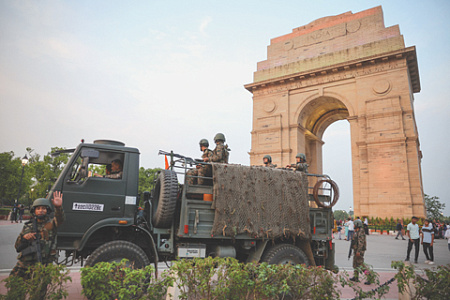
US President Donald Trump has proposed to Delhi and Islamabad to resolve the conflict over Kashmir, which broke out almost 80 years ago, after the former British colony was divided into two states. And now that another Indo-Pakistani war over disputed territory has been averted, Trump claims to know how to put an end to the confrontation between the neighbors. Delhi was skeptical about the American president’s ideas.
The host of the White House said that it was the United States that prompted Delhi and Pakistan to agree to a truce. Here, according to him, Washington’s merit is indisputable. Moreover, Trump has previously claimed that he knows the secret of how Delhi and Islamabad can end their long-standing feud over Kashmir.
That is, he is supposedly able to correct the fatal mistake made by London when, in 1947, he handed over the reins of government over the subcontinent into the hands of the leaders of two new states.
According to The Times of India, Delhi did not accept Washington’s interpretation of the events. The Indian Ministry of Information indicated that senior officials of India and Pakistan themselves contacted each other and agreed on a cease-fire. In other words, Delhi is firmly following its course, which is that the Indian-Pakistani conflict should be resolved by its direct participants directly, without any outside interference. In 1965, the parties concluded an armistice under the mediation of the head of the Soviet government, Alexei Kosygin. Nowadays, Delhi is not satisfied with this option. The parties agreed to resolve disputes directly back in 1972 by signing an agreement in the Indian city of Simla.
Pakistan, on the other hand, lavishes praise on Trump for his assistance to the ceasefire process. This is the state of Indian-Pakistani relations at the time of signing the issue of the newspaper.
However, in reality, the ceasefire agreement remains extremely fragile. This creates a dangerous situation. After all, both Delhi and Islamabad possess nuclear weapons. According to Western experts, India and Pakistan have parity here. But Delhi did not mention the possibility of using nuclear weapons. And Pakistan made it clear that if the very existence of the state was at stake, then weapons of mass destruction could be activated.
According to CNN, the truce seems to be being respected, despite the fact that both sides accuse each other of violating it. Explosions were heard in both Indian–controlled and Pakistani–controlled parts of Kashmir. But the reporters could not quickly visit the site of these tragic events. An impartial analysis of the situation is also hampered by the fact that both sides are silent about their losses, especially during air battles between fighters, and exaggerate the damage inflicted on the enemy. Nevertheless, both India and Pakistan reaffirmed their commitment to the ceasefire agreement announced on Saturday.
The reason for the conflict this time was the killing of 26 tourists by militants who made their way through the line of control into the Indian part of Kashmir in April. Pakistan denies involvement in the crime. Although it is hard to believe that fanatical adherents of the “holy war against infidels” could build nests in Pakistani Kashmir without the knowledge of Pakistan’s powerful Inter-Services Intelligence.
In response, India launched a military operation both in the Pakistani part of Kashmir and in the Pakistani province of Punjab, where the two states are separated by an internationally recognized border.
Residents of the Indian-controlled part of Kashmir say they breathed a sigh of relief when they learned of the ceasefire agreement. They began to return to their villages and are trying to assess the extent of the destruction caused by the Pakistani bombing. Given that the authorities have imposed harsh rules in this union territory, which is governed by Delhi, local residents ask journalists not to name them. But everyone says they hope for a normalization of the situation. The tension is aggravated by the religious factor. In the Indian part of Kashmir, the majority of the population, as in Pakistan as a whole, are Muslims. And in India, the majority of the population are Hindus.
The tension between India and Pakistan is reinforced by another circumstance. The Indus River water sharing agreement between the two countries has been temporarily terminated. This was reported to CNN by a source in the Indian Foreign Ministry. India postponed the validity of this treaty, signed in 1960, after the terrorist attack in Kashmir. This agreement was a symbol of the fact that rival states can still conclude mutually beneficial deals.
The Indus River originates in Tibet, flows through China, the Indian part of Kashmir and then into Pakistan. The waters of the Indus and its tributaries serve as a source of irrigation for hundreds of millions of people in Northern India and Pakistan. Islamabad called any attempt to reduce or completely shut down the flow of Indus waters to Pakistan an act of war. This topic, according to the Minister of Defense of Pakistan, will be discussed at meetings of officials of both states.
